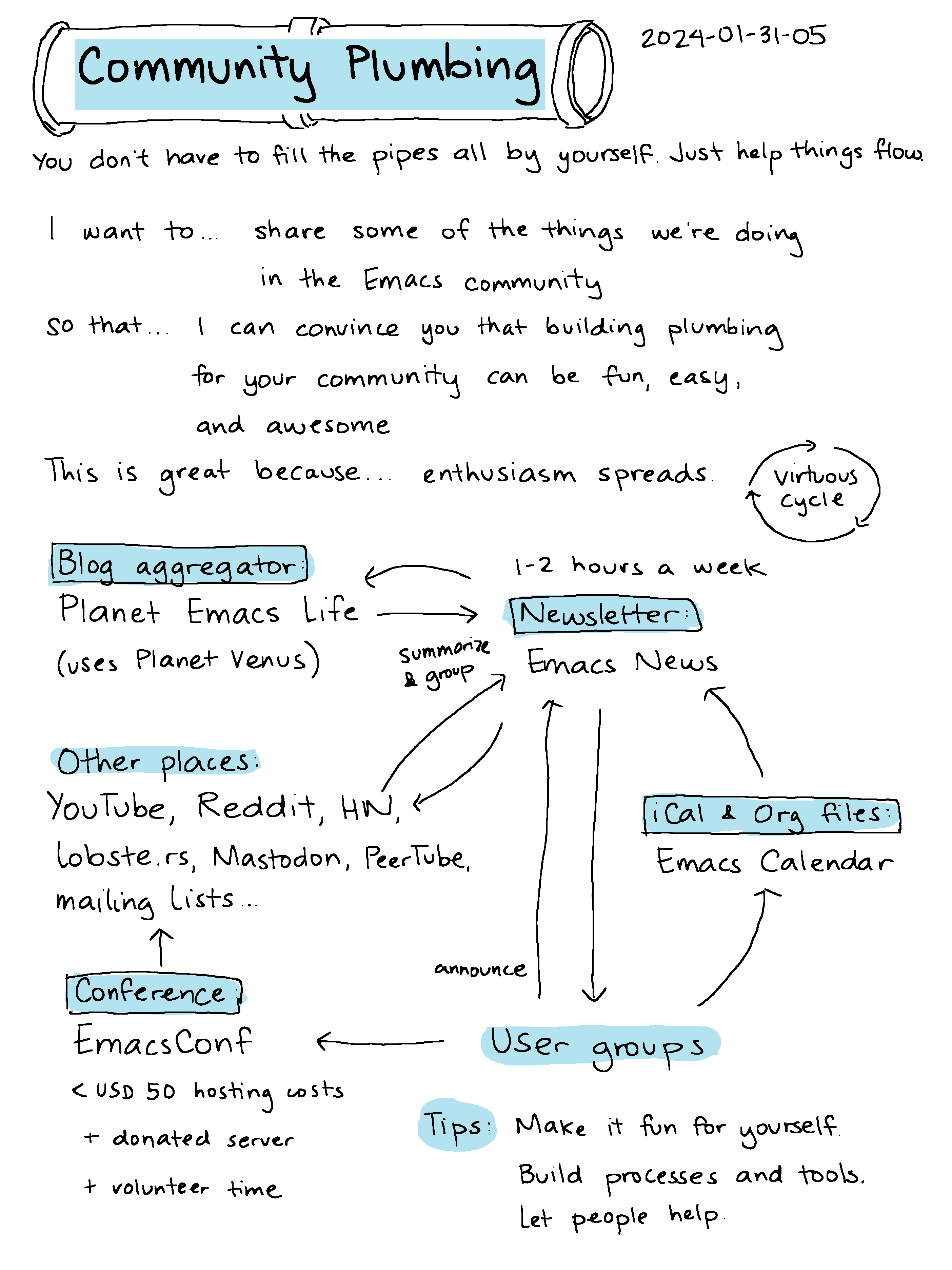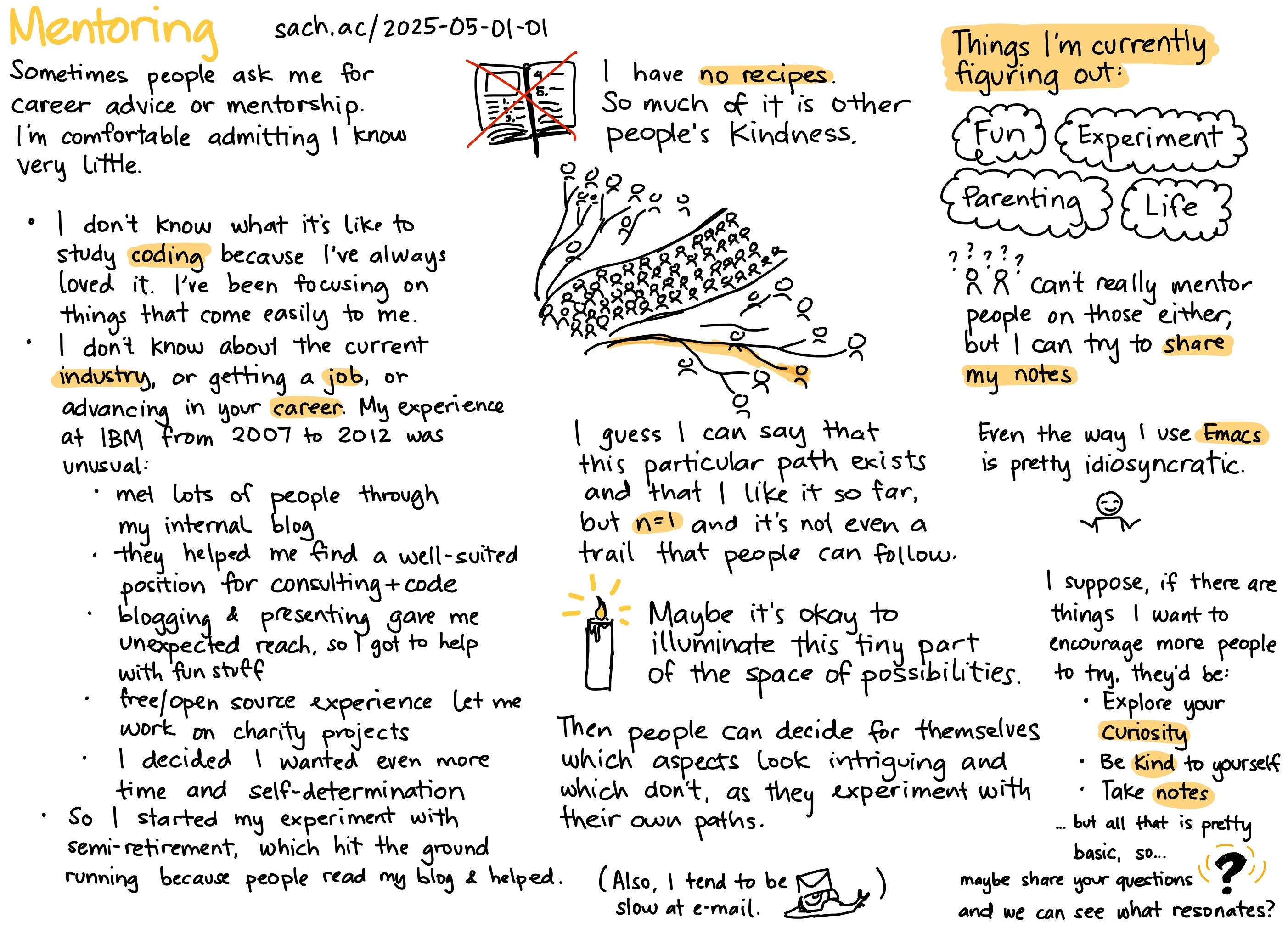Working on the plumbing in a small web community
| community, connecting, emacs, bloggingThe IndieWeb Carnival prompt for May is small web communities. I've been exploring some thoughts on how a little effort goes a long way to connecting a community. Sometimes I think of it as working on the plumbing so that ideas can flow more smoothly. It feels a little different from the direct contribution of knowledge or ideas. I also want to connect with other people who do this kind of thing.
Emacs is a text editor that has been around since the 1970s. It's highly programmable, so people have come up with all sorts of ways to modify it to do what they want. It's not just for programmers. My favourite examples include novelists and bakers and musicians who use Emacs in unexpected ways. Because Emacs is so flexible, community is important. The source code and documentation don't show all the possible workflows. As people figure things out by themselves and together, more possibilities open up.
I love tweaking Emacs to help me with different things I want to do, and I love learning about how other people use it too. I've been sharing my notes on Emacs on this blog since 2001 or so. In 2015, as I was getting ready to become a parent, I knew I was going to have much less time and focused attention, which meant less time playing with Emacs. Fortunately, around that time, John Wiegley (who was one of the maintainers of Emacs at the time) suggested that it would be helpful if I could keep an eye on community updates and summarize them. This worked well with the fragmentation of my time, since I could still speed-read updates and roughly categorize them.
Text from sketch
Community plumbing
You don't have to fill the pipes all by yourself. Just help things flow.
I want to share some of the things we're doing in the Emacs community so that I can convince you that building plumbing for your community can be fun, easy, and awesome. This is great because enthusiasm spreads.
virtuous cycle
- Other places: YouTube, Reddit, HN, lobste.rs, Mastodon, PeerTube, mailing lists….
- Blog aggregator
- Planet Emacs Life (uses Planet Venus) - update: I wrote my own RSS feed aggregator instead.
- Newsletter: Emacs News, 1-2 hours a week
- summarize & group
- announce calendar events
- User groups
- [often use Emacs News to get conversations going]
- iCal & Org files: Emacs Calendar
- Conference
- EmacsConf: < USD 50 hosting costs + donated server + volunteer time
Tips:
- Make it fun for yourself.
- Build processes and tools.
- Let people help
2024-01-31-05
Some more notes on the regular flows built up by this kind of community plumbing:
Daily: Lots of people post on reddit.com/r/emacs and on Mastodon with the #emacs hashtag. I also aggregate Emacs-related blog posts at planet.emacslife.com, taking over from planet.emacsen.org when Tess had DNS issues. There are a number of active channels on YouTube and occasionally some on PeerTube instances as well. I don't need to do much work to keep this flowing, just occasionally adding feeds to the aggregator for planet.emacslife.com.
Weekly: I collect posts from different sources, remove duplicates, combine links talking about the same thing, categorize the links, put them roughly in order, and post Emacs News to a website, an RSS feed, and a mailing list. This takes me maybe 1.5 hours each week. It's one of the highlights of my week. I get to learn about all sorts of cool things.
Weekly seems like a good rhythm for me considering how active the Emacs community is. Daily would be too much time. Monthly would lead to either too long of a post or too much lost in curation, and the conversations would be delayed.
Sometimes I feel a twinge of envy when I check out other people's newsletter posts with commentary or screenshots or synthesis. (So cool!) But hey, I'm still here posting Emacs News after almost ten years, so that's something. =) A long list of categorized links fits the time I've got and the way my mind works, and other people can put their own spin on things.
Monthly: There are a number of Emacs user groups, both virtual and in-person. Quite a few of them use Emacs News to get the discussion rolling or fill in gaps in conversation, which is wonderful.
Some meetups use meet.jit.si, Zoom, or Google Meet, but some are more comfortable on a self-hosted service using free software. I help by running a BigBlueButton web conferencing server that I can now automatically scale up and down on a schedule, so the base cost is about 60 USD/year. Scaling it up for each meetup costs about USD 0.43 for a 6-hour span. It's pretty automated now, which is good because I tend to forget things that are scheduled for specific dates. My schedule still hasn't settled down enough for me to host meetups, but I like to drop by once in a while.
Yearly: EmacsConf is the one big project I like to work on. It's completely online. It's more of a friendly get-together than a formal conference. I have fun trying to fit as many proposed talks as possible into the schedule. We nudge speakers to send us recorded presentations of 5-20 minutes (sometimes longer), although they can share live if they want to. A number of volunteers help us caption the videos. Each presentation is followed by Q&A over web conference, text chat, and/or collaborative document. Other volunteers handle checking in speakers and hosting the Q&A sessions.
It's a lot of fun for surprisingly little money. For the two-day conference itself, the website hosting cost for EmacsConf 2024 was about USD 56 and our setup was able to handle 400 viewers online (107 max simultaneous users in various web conferences).
EmacsConf takes more time. For me, it's about 1.5 hours a day for 4 months, but I think mostly that's because I have so much fun figuring out how to automate things and because I help with the captions. Lots of other people put time into preparing presentations, hosting Q&A, participating, etc. It's worth it, though.
I like doing this because it's a great excuse to nudge people to get cool stuff out of their head and into something they can share with other people, and it helps people connect with other people who are interested in the same things. Some Q&A sessions have run for hours and turned into ongoing collaborations. I like turning videos into captions and searchable text because I still don't have the time/patience to actually watch videos, so it's nice to be able to search. And it's wonderful gathering lots of people into the same virtual room and seeing the kind of enthusiasm and energy they share.
So yeah, community plumbing turns out to be pretty enjoyable. If this resonates with you, maybe you might want to see if your small web community could use a blog aggregator or a newsletter. Doesn't have to be anything fancy. You could start with a list of interesting links you've come across. I'm curious about what other people do in their communities to get ideas flowing!
Related: the community plumbing section of my blog post / livestream braindump.



